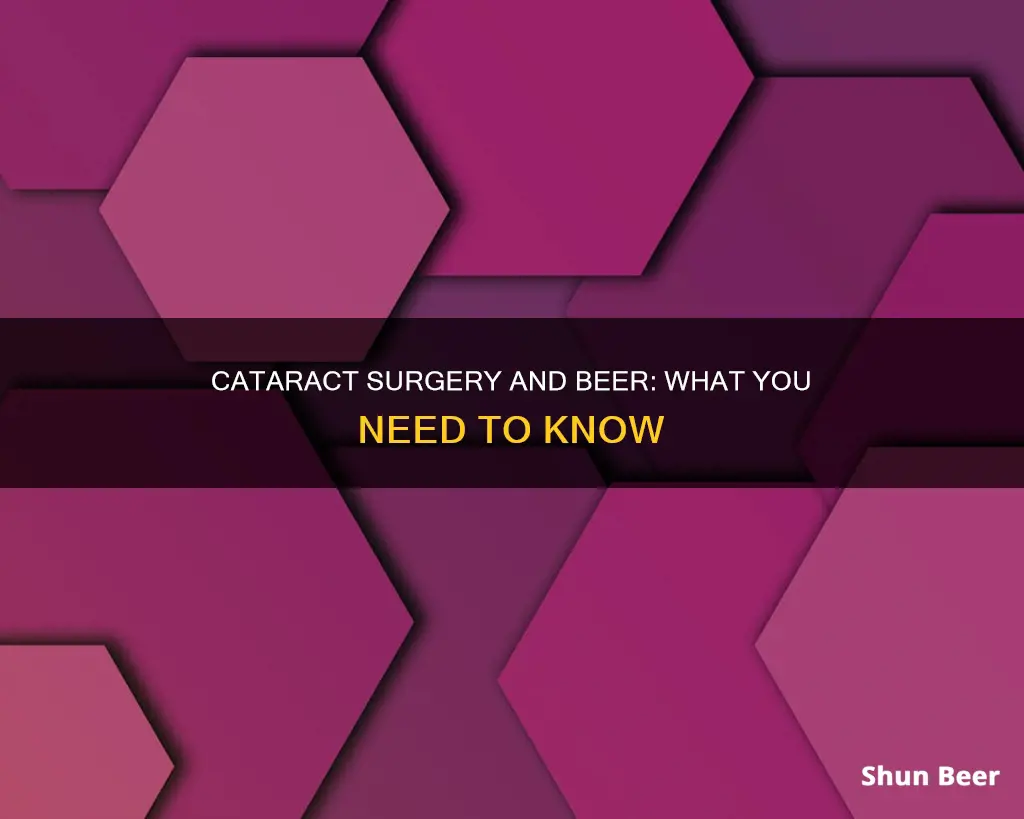
If you've recently had cataract surgery, you're probably wondering when you can get back to your normal routine – and that might include enjoying a beer or two. The good news is that you won't have to wait too long. Most sources recommend that you refrain from drinking alcohol for at least 24 hours after surgery, but some advise waiting up to a week. This is to ensure that your body can heal effectively and to avoid dehydration, which can be particularly problematic after eye surgery. Alcohol can also interfere with any medications you've been prescribed post-surgery, and it can increase your risk of infection. So, while you might be eager to celebrate your improved vision, it's best to hold off on that beer for a little while to ensure a smooth recovery.
| Characteristics | Values |
|---|---|
| Time to wait before drinking beer after cataract surgery | 1 day to 1 week |
| Reasons to wait | Dehydration, lower defences, interference with medication, risk of swelling |
What You'll Learn
- It is recommended to wait at least 24 hours after cataract surgery before drinking beer
- Alcohol can dehydrate the body and eyes, affecting recovery
- Drinking after surgery may increase the risk of infection
- Alcohol can interfere with any medication or eye drops
- Blood-thinning properties of alcohol can increase the risk of bleeding during and after surgery

It is recommended to wait at least 24 hours after cataract surgery before drinking beer
Firstly, alcohol has a dehydrating effect on the body. After cataract surgery, your eyes are already at a higher risk of dryness, and alcohol consumption can exacerbate this issue. It is important to keep your eyes well-hydrated during the recovery process to promote proper healing.
Secondly, alcohol can interfere with any medications you may be taking after the surgery. Certain antibiotics or eye drops prescribed by your doctor might not work effectively if mixed with alcohol. Additionally, alcohol can increase the risk of side effects such as nausea or dizziness.
Moreover, alcohol can lower your body's natural defences, making you more susceptible to infection. Following cataract surgery, your body is in a vulnerable state, and drinking alcohol can reduce your ability to fight off bacteria, potentially leading to complications.
It's worth noting that while these risks are relatively low, drinking alcohol too soon after surgery can increase the chances of experiencing side effects. To ensure a smooth and safe recovery, it is best to wait at least 24 hours and follow the advice of your doctor or surgeon regarding alcohol consumption.
During this initial recovery period, it is important to prioritise your eye health and well-being. By refraining from drinking beer or other alcoholic beverages for at least 24 hours, you can help ensure that your body heals effectively and reduce the risk of any complications.
Beer Choices of the SEAL Team: What's Their Favorite Brew?
You may want to see also

Alcohol can dehydrate the body and eyes, affecting recovery
Alcohol is a diuretic, which means it increases the production of urine. This can lead to dehydration, as the body loses fluids and important electrolytes more quickly than it would without alcohol. Dehydration can negatively impact the body's ability to heal and recover after surgery.
The eyes are particularly susceptible to dehydration, as they are sensitive organs with a high water content. Cataract surgery is a delicate procedure, and proper hydration is crucial for optimal recovery. Alcohol consumption can dehydrate the eyes, leading to dryness, discomfort, and even impaired vision.
In addition, alcohol can interfere with the absorption and effectiveness of medications, including eye drops, that are often prescribed after cataract surgery. It can also increase the risk of bleeding and slow down the healing process.
To ensure a smooth recovery after cataract surgery, it is generally recommended to abstain from alcohol for at least 24 hours, or even up to a week, following the procedure. This allows the body and eyes to heal properly and reduces the risk of complications.
It is also important to note that, while the effects of alcohol may be more noticeable after surgery, regular alcohol consumption over an extended period can also have negative consequences for eye health, including an increased risk of cataracts.
Energy and Alcohol: Do Beer and Red Bull Work?
You may want to see also

Drinking after surgery may increase the risk of infection
Drinking after cataract surgery may increase the risk of infection. While the recovery period for laser eye surgery is usually very brief, it is important to follow a few guidelines to allow your eyes to heal.
Drinking beer or wine may seem harmless, but the alcohol in your favourite tipple can have a significant effect on your body's ability to recover. Alcohol is a depressant, meaning it affects the central nervous system and slows down messages between the brain and the body. This can result in slurred speech, slower reaction times, and impaired judgment. Additionally, alcohol can thin the blood, making it harder to control blood loss during and after surgery.
One of the main risks of drinking alcohol after surgery is dehydration. Alcohol has a dehydrating effect on the body, and in the days following laser eye surgery, patients are already at a greater risk of dry eyes. Dehydration can exacerbate this issue and make it more difficult for the eyes to heal.
Alcohol can also lower your defences against bacteria, increasing your chances of infection. During the recovery period, your body is more vulnerable, and alcohol can reduce your natural resistance to bacteria. This can be especially problematic if you are taking antibiotics or other medications to aid healing, as alcohol can interfere with their effectiveness.
Furthermore, alcohol can lead to side effects such as sickness or dizziness, especially if it interacts with your medication. It is crucial to follow your surgeon's advice regarding medication and alcohol consumption to avoid any adverse effects.
To ensure a smooth recovery, it is recommended to avoid drinking alcohol for at least 24 hours after surgery, and sometimes a few days more. This allows your body to heal and reduces the risk of complications. By refraining from alcohol and following your surgeon's aftercare guidelines, you can give yourself the best chance of a full and speedy recovery.
Hypoglycemia and Beer: Is It Safe to Drink?
You may want to see also

Alcohol can interfere with any medication or eye drops
While cataract surgery is a minimally invasive procedure, it is still a form of surgery and should be treated with caution. It is important to follow a few guidelines immediately after the procedure to allow your eyes to heal.
Alcohol can interfere with any eye drops or medication given during and after the procedure. It is important to follow the instructions given by your doctor regarding medication and eye drops, as consuming alcohol may stop them from working properly. It could also lead to side effects such as sickness or dizziness.
Your doctor will provide you with clear guidance on when and how to use the prescribed eye drops. It is important to follow their instructions and avoid alcohol consumption, as it may hinder the effectiveness of the eye drops.
In addition to interfering with eye drops, alcohol can also impact the effectiveness of medications. This includes antibiotics or other medications prescribed to aid the healing process after cataract surgery. Consuming alcohol during the recovery period may increase your risk of infection and hinder your body's ability to heal.
It is always recommended to consult your doctor or surgeon for specific advice regarding alcohol consumption after cataract surgery. They will provide personalized guidance based on your medical history and the details of your surgery.
Beer Consumption and Liver Damage: How Much is Too Much?
You may want to see also

Blood-thinning properties of alcohol can increase the risk of bleeding during and after surgery
While drinking beer after cataract surgery may seem harmless, alcohol has a significant effect on the body's ability to recover from surgery. As a blood thinner, alcohol increases the risk of bleeding during and after surgery. This can make it difficult to control blood loss during the procedure and manage swelling afterward.
Alcohol's blood-thinning properties can be particularly problematic during cataract surgery. This type of surgery is performed on the eye, an area of the body that is highly sensitive and prone to complications. Even a small amount of bleeding or swelling can have serious consequences for vision. Therefore, it is crucial to avoid alcohol consumption before and after cataract surgery to minimize the risk of bleeding and swelling in the eye.
In addition to increasing the risk of bleeding, alcohol consumption can also lead to dehydration, which can exacerbate dry eye symptoms commonly experienced after laser eye surgery. Alcohol interferes with the body's ability to absorb and retain water, resulting in dehydration. This can affect moisture levels throughout the body, including the eyes, and increase the risk of dry eye syndrome.
Furthermore, alcohol can reduce the body's natural resistance to bacteria, increasing the risk of infection during the recovery period. It can also interfere with medications prescribed to aid the healing process, such as antibiotics, potentially causing adverse side effects.
To ensure a smooth recovery and minimize the risk of complications, it is generally recommended to refrain from consuming alcohol for at least 24 to 48 hours before and after cataract surgery. It is important to follow the specific guidelines provided by your surgeon, as they will have the best understanding of your medical history and the details of your surgery.
Beer and Low-Fat Diets: Friends or Foes?
You may want to see also
Frequently asked questions
It is recommended that you wait at least 24 hours after cataract surgery before drinking alcohol, with some sources suggesting waiting up to a week.
Drinking alcohol can affect your body's ability to recover from surgery. Alcohol can cause dehydration, lower your body's natural defences, and interfere with any medication you may be taking. It can also increase the risk of swelling and inflammation, which may slow down your recovery time.
It is important to follow the advice of your doctor or surgeon regarding when it is safe to consume alcohol after cataract surgery. Generally, you should wait until any antibiotics or other medications are no longer needed and until your body is no longer at an increased risk of infection.
Yes, it is important to remember that alcohol can have a dehydrating effect on the body, including the eyes. After cataract surgery, the eyes may already be at a greater risk of dryness, so it is advisable to avoid anything that could make this worse and to prioritise hydration.







